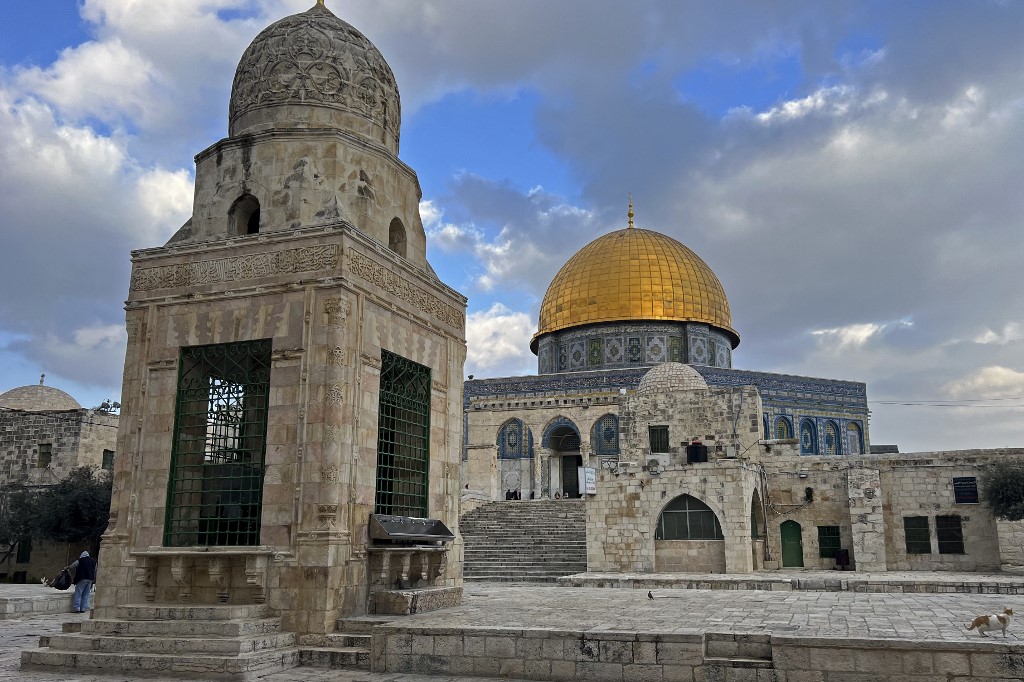Israel has completely blocked access to Al-Aqsa Mosque in occupied East Jerusalem for the first time since the Covid-19 pandemic.
Local sources told the Palestinian Wafa news agency that Israeli forces stormed the mosque after dawn prayers on Friday to clear the area of any worshippers.
The Israeli military then sealed the doors to Al-Aqsa and banned worshippers from entering the mosque before sealing its gates, according to eyewitnesses who spoke to Wafa.
This shutdown means Muslim worshippers will be unable to conduct Friday prayers at the mosque, revered as the third holiest site in Islam.
The closure comes as Israel issues a complete lockdown across the occupied West Bank following the wave of attacks it launched on Iran.
New MEE newsletter: Jerusalem Dispatch
Sign up to get the latest insights and analysis on
Israel-Palestine, alongside Turkey Unpacked and other MEE newsletters
Aoun Bazbaz, director of international affairs, diplomacy, and tourism at the Islamic Waqf in Jerusalem, told Middle East Eye he was concerned Israel was using its escalation with Iran as cover to take further control of the Al-Aqsa mosque compound.
“The Israelis have claimed that the closure was to ‘protect the people’—but only Waqf employees have been allowed to enter al-Aqsa since,” Bazbaz said. “The real problem is, we’ve received no guarantees about when it will reopen. That uncertainty is deeply suspicious.”
“There’s no doubt that Israel is using the current war conditions to impose new restrictions and create new facts on the ground,” he told Middle East Eye. “While the world—and particularly the Islamic world—is focused on Gaza and Iran, Israel is quietly advancing its plans at al-Aqsa.”
“For over 20 years, they’ve been working on dividing the mosque in terms of time and space—and 99% of that plan has now been implemented. The daytime hours are for raids and tourists. It’s become the new normal.”
“Bab al-Rahma, the eastern section of the compound, has been given another name. It’s effectively become a place of worship for settlers—an undeclared temple. Just yesterday, they were dancing there, thanking [National Security Minister] Ben-Gvir for what he’s done at al-Aqsa.”
“The changes in the last six or seven months have been incredibly fast—so fast that even the media hasn’t fully covered what’s happening. I told my wife yesterday, based on what I’ve seen recently, I wouldn’t be surprised if they soon force worshippers to book appointments through an app just to pray at noon or in the evening.”
“Now, with the war on Iran, we are seriously concerned that even more restrictions are coming.”

Al-Aqsa: Israeli incursions have increased by more than 18,000 percent since 2003
Read More »
Earlier on Friday, Wafa reported that Israel had closed dozens of military checkpoints and gates across the West Bank, blocking several secondary roads between Palestinian towns, villages and cities with dirt mounds.
The Allenby Bridge, also known as the King Hussein Bridge, and the only exit point for most Palestinians in the West Bank to travel abroad, was also shut down by Israeli authorities on Friday.
Al-Aqsa, known to Muslims as al-Haram al-Sharif, has long been a source of tension resulting from frequent raids by Israeli settler groups, backed by Israeli troops, into the complex, which is reserved for Muslim prayer under a longstanding agreement.
Far-right Israeli groups have increasingly pushed for access and control over the site, which is known to Jews as Temple Mount, a move Palestinians view as part of a wider campaign to alter the status quo and assert Israeli sovereignty over occupied East Jerusalem.
Under international law, East Jerusalem is considered occupied territory, and the closure of a major religious site raises serious concerns over violations of Palestinians’ rights to worship and freedom of movement.
Human rights groups have long condemned the use of mosque closures as a form of collective punishment and political pressure.

